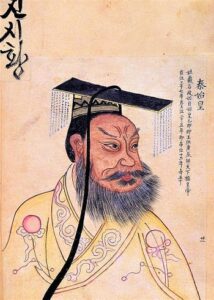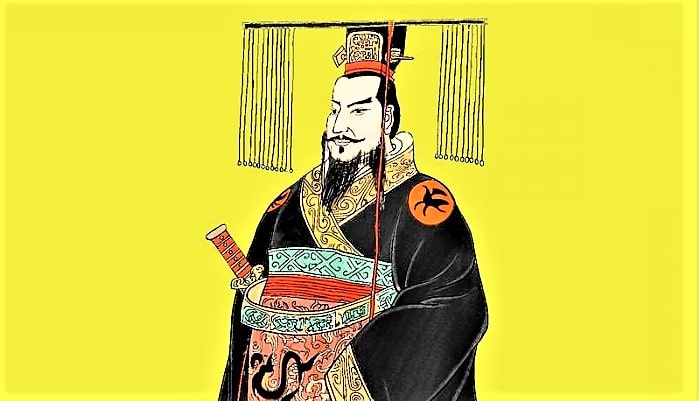Qin Shi Huang (Born on February 18, 259 BC – Died on September 10, 210 BC) sometimes he is called chain Shi Huang, and sometimes Shi Huang di, sometimes he is called Yin Zhang, and other times Zhao Zhang. They all refer to the same person regardless of the moniker the man behind the name represents one of the most important figures in the history of china.
He was the founder of the Qin dynasty it was short-lived only lasting 15 years but it had a great impact on the country. That is because the Qin dynasty was the first to rule over united imperial china. Before becoming emperor Chiang Shi Huang was king of the Qin state and during an explosive time known as the warring states period.
He emerged victorious in a battle for supremacy against his neighboring kingdoms conquering them all and bringing them under his dominion. This would have been enough to earn Qin Xi Huang a place in the history books.
But the new administrative policies that he introduced also represented a stark departure from the way things had been done for centuries trying to ensure that China would never have a warring state period again.
Then there was the ambitious construction projects chief among them the famed great wall of china and the thousands of terracotta warriors that still guard the emperor’s mausoleum to this day. Qin Shi Huang spent the last years of his life in a bizarre pursuit, of the elixir of life so that he could live forever.
Things might not have worked out exactly as he would have wanted in the end but his actions certainly immortalized, him as one of china’s greatest rulers.

Quick Facts About Qin Shi Huang
- Born: 18 February 259 BC, Handan, China
- Full Name: Ying Zheng
- Known For: unification of ancient China
- Children: Fusu, Gongzi Jiangsu, Gongzi Gao, Hu Hai
- House: Qin
- Honor: First Emperor
- Father: King Zhuangxiang of Qin
- Mother: Queen Dowager Zhao
- Siblings: Chengjiao
- Died: 10 September 210 BC (aged 49)
- Buried: 210 BC, Mausoleum of the First Qin Emperor, Xi’an
Biography of Qin Shi Huang
Qin Shi Huang was born circa 259 BC in Handan, as his moniker implies, in the Qin state he is usually known as Ying Zheng, sometimes also called Zhao Zheng. However, once he had conquered all the other states in unified china, he gave himself the new title of Huang di or emperor and assumed the regnal names of Xi Hong-di which meant the first emperor and Qin Shi Huang.
His parentage is somewhat controversial thanks to an ancient historian named Sima Qian who indicated that Ying’s father might not have actually been his real father. Apparently, Ying-Jiang was the eldest son of king Zhuangxiang of Qin and Lady Zhao. According to the historian, the king and his future queen met back when he was still known as prince Yiren.
He was being held hostage in Zhao another one of the warring states in order to ensure peace between their two kingdoms. However, the prince was liberated with the help of a wealthy and influential merchant named Lü Buwei who also introduced him to his future wife known at the time as Zhao Ji.
But what prince Yiren never found out was that Zhao was one of the Lü’s former concubines, and might already be pregnant with his child when the two married and therefore, Ying Zhiang would have actually have been the son of Lü Buwei, and not king Zhuangxiang of course, there is no way to verify this.
It’s also possible the historian invented this to slander the former emperor but either way, this is a rumor that has persisted for millennia, regardless Zhuangxiang only ruled for three years as king of Ching before dying in 246 bc and being succeeded by Ying Zheng.
His son, however, was only 13 years old at the time so Lü Buwei stepped in again to serve as his regent, again we’re going strictly on the word of Sima Qian, but it seems that once the king was out of the picture Lü resumed his affair with the queen dowager Zhao, or maybe it never really ended in the first place.
The years went on, and Ying Zhang was getting closer to assuming control of the kingdom Lü was becoming more concerned with the possible consequences of his illicit relationship with the young king’s mother, therefore he tried to distance himself from queen Zhao.
She was not too thrilled with this idea, not necessarily because of her affection for Lü but because she still wanted someone to satisfy her desires. To compromised lu found a good substitute who would have been more than capable of rising to the occasion.
His name was Lao-ai and he was allegedly so well endowed that he could spin a wheel on his erect member of course the queen wouldn’t have been allowed publicly to have a boy toy so Lao-ai was always shaved and dressed to look like a eunuch.
Queen Zhao was very happy with this arrangement, and Lao-Ai quickly became her core favorite, she gave him titles, wealth, and power and the couple might have even had two children together. But all of this went to his head and soon enough he started to get ideas about overthrowing Ying Zhang and installing one of his own sons as the new king.
Around 238 bc Ying Zheng found out the truth and he decided to execute a whole bunch of people so Lao-ai left with nothing to lose tried to stage a revolt. He couldn’t get many people to rally to his cause though and the rebellion was easily crushed.
Lao-ai was killed by being torn apart by horses while three generations of his family were also executed including his two sons, with the queen of course. As for Zhao, she was not killed but condemned to live under house arrest for the rest of her life for his role in the affair.
Lü Buwei was also punished by being stripped of his powers and banished to a remote part of the kingdom. He committed suicide by drinking poison a few years later. Then Ying Zheng assumed full power as the king of Ching and was able to dedicate himself towards his true goal, which was conquering the six other warring states.
The King of Qin
Right from the start, Ying Zheng had an advantage over his adversaries because the kingdom he inherited was the largest and most powerful of the warring state, and also had a good position at the western edge of the Chinese territory. First of all was Han, which did not prove to be overly difficult as it was the weakest of the seven kingdoms.
It was located in the middle of ancient china so ever since it declared independence in the late 4th-century bc. It had always been surrounded by bigger more powerful states and it could never expand, unlike its neighbors. The main reason why it had survived thus far was that whenever one state tried to invade it another one usually came to its defense out of self-interest in order to prevent its enemy from growing too powerful.
But this mattered little to Ying since he intended to attack everyone anyway. In 230 bc he marched his army into Han and the state was conquered that same year, afterwards came a much bigger foe the Zhao state. The two states had already had a war a few decades prior it culminated in the battle of Chiang ping in 260 bc and ended in a decisive victory for Chiang.
Therefore the Zhao state that Ying Zheng faced was a much weaker one than it used to be, even so, this would prove to be the king’s longest military campaign one that saw him face many setbacks and even defeats. Zhao had one big ace up his sleeve his name was Li-mu and he is considered one of the greatest generals of ancient china.
He was one of the main reasons why Zhao was not overrun immediately, even when Xiang gained territory li mu defeated them in combat several times especially at the battle of Fei in 233 bc. As long as he was still standing the enemy found it difficult to make any permanent headway in Zhao. If he could not achieve his goal through war Ying Zhang resulted in deceived.
The details were a bit unclear but he used spies and bribes in order to sow discord in the Zhao court, specifically he got the king of Zhao Youmiu to distrust li mu and relieve him of his position the former general died around 229 bc after being either executed or forced to commit suicide. Afterward, Ying found it much easier to defeat Zhao he captured Handan the state’s capital in 228 bc, and executed king Youmiu, in essence, the Xiao state had been conquered and eliminated as a threat.

